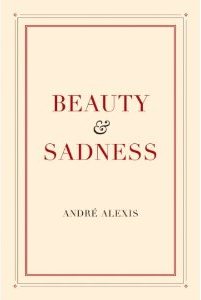André Alexis’s new book, he writes, is an “attempt to see over the fence of my own imagination, to look beyond the self into other worlds.” Indeed, in Beauty and Sadness — a collection of four stories, two essays and a memoir — Alexis has written a number of pieces that explore the liminal space between worlds.
Alexis — the author of two novels, Childhood and Asylum, and a volume of short fiction, Despair — was born in Trinidad in 1957 and came to Canada in 1961. As such, he uses the language of immigration to articulate his engagement with literature. “I explore literary worlds and use unfamiliar literary symbols as I explored Canada…when I first came to the country.”
The four stories in Beauty and Sadness are as much a writing experiment for Alexis as they are a reading experience for us. He explains in the book’s introduction that each story is a conscious attempt to adopt another writer’s sensibilities and refract that writer’s style through Alexis’s own imagination. The ghost stories that make up this section of the book are quite wonderful, as Alexis inhabits the literary worlds of Guy de Maupassant, Jean Cocteau, Henry James (with a touch of Carlos Fuentes) and Yasunari Kawabata.
The stories are erudite and eerie, all focusing on male heroes who find the stability of their world dismantled as they encounter what Alexis call “avatars of death or chaos.” But Alexis is not writing tales of sensational horror — the tone of the stories is sustained by a measured, detached narrative presence.
Alexis, as he promises, inhabits the literary worlds of his muses. For example, like the work of its namesake, “Maupassant” is economically written, wry and macabre, as Perry meets an unusual magician on a train. Their strange encounter and its absurd fallout (involving homicidal furniture) bring about a meditation on the nature of the supernatural, as Perry thinks that it is “easy to imagine a sacred world adjacent to this one, a world in which everything human was diminished and every speck of earth was a symbol of the divine or its opposite.”
The concept of another dimension in which everything possesses symbolic significance also evokes the sphere of literature, in which similarly ordered worlds are conjured by the minds of authors.
Alexis’s best story is “Cocteau,” an ethereal, sublime fable that evokes the decadent works of the French writer. Like Keats and Rimbaud before him, the story’s protagonist, Marin Herbert, is himself half in love with easeful Death — except for Marin, she is personified. He is poet, but also a caretaker, charged with the night shift at a haunted tower. Here, he falls in love with Death, a looming, eroticized female figure in a rippling white robe who moves “through the darkness like a wind through curtains.”
Once again, we see the protagonist breach the threshold between life and death, as Marin stumbles upon the world of the dead while seeking his ghostly paramour. Alexis explicitly links the world of poetry with death, as Marin’s poetic output becomes increasingly prodigious and he disengages with reality after his visit to the underworld.
The worlds we visit here — the ghostly sepulchres of Jean Cocteau, the luxuriant France of Henry James, or the prosaic villages of Yusunari Kawabata — are modeled after the worlds built by those authors, but brought to life by Alexis’s own artistic preoccupations and narrative cadence. It’s hard to know whether Alexis’s experiment was successful on his terms, but the stories are a pleasure to read.
The two essays that follow the stories, analyzing the works of Leo Tolstoy and Samuel Beckett, are somewhat academic, but supplement the stories nicely. The Tolstoy essay is particularly strong, as Alexis links his fascination with death back to his childhood in Trinidad. “I first learned about death as a child in Trinidad,” he says, “and I’ve never managed to shake the feeling that death itself is Trinidadian.” He supports this claim by telling several Trinidadian folk tales involving spectres of death, much like those that appear in his stories, and proceeds to analyze both Tolstoy’s The Death of Ivan Ilych, and, to a lesser extent, Henry James’s The Turn of the Screw as stories in which presentiments of death are felt throughout, culminating in confrontations with the other side.
The final section of Beauty and Sadness, entitled “Water: A Memoir,” is also the collection’s weakest piece. The memoir documents Alexis’s maturation as a writer and his reflections on the Toronto literary scene — including the now — infamous diatribe condemning Canadian critical culture, first published in The Walrus. Rounding off the “memoir” are a couple of book reviews for good measure, as if to show how it’s done. The memoir is not only smug and self-congratulatory, but it reveals little about Alexis’s own writing practices — instead, it consists of name-dropping, posturing and whining.
But independent of “Water”‘s value in and of itself, it is a curious and uneven choice to round out a collection that is otherwise so thematically rich and unified. In his stories and essays, Alexis adopts the role of a traveler between worlds both literary and metaphysical, expounding on the nature of art and death.
But “Water” is a jarring contrast, barely addressing these themes, and focusing instead on Alexis’s impressions of Canadian literary culture. Rather than looking beyond the self, as he sets out to do in the book’s introduction, “Water” is simply an exercise in introspection.
Apart from its final piece, however, Alexis has crafted a sophisticated collection that will certainly find an appreciative audience. Readers will savour Alexis’s paean to literature as a medium that opens portals into other worlds, be they foreign countries, the mystical afterlife, or the imaginations of others.—Emily Landau




